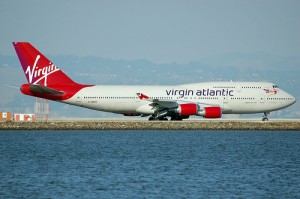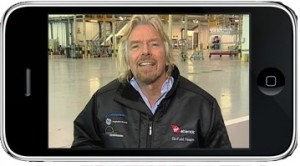
Virgin Atlantic "Tubular Belle" Boeing 747-400 that is taxiing (get it?)
Have you ever flown into a large city, had to grab a taxi downtown and thought, “man there have to be other people doing the same thing? I wish I could save a few bucks and share a cab.” Maybe you had the guts to ask people around you where they were going, but for those of us who don’t, you now have another option.
Virgin Atlantic working with NESTA (UK endowment to support innovation) is helping to test a program to help passengers share a Taxi. Called Taxi2, passengers can sign up on their website, input their flight details, they are then sent information on a probable match and can choose to accept or reject the match. The site will let you pick the sex of your passenger (presumably for safety female passengers, not to set up a date) and the program is not limited to just Virgin Atlantic customers.
Ed Maklouf, founder of Taxi2, said, “We are delighted to be partnering with Virgin Atlantic for this scheme, and our expectation is that this simple, sensible way of saving money and cutting down congestion and carbon footprint will become common activity for air travelers worldwide.”
You are even able to print off your own mini-sign (called “Clever-Ticket”) to help meeting up with your new taxi-friend.
The website isn’t clear where passengers can use the service. I asked Virgin Atlantic and they said, “Since the service is in beta for the first few months we developed it for the London to NY routes initially, however passengers traveling to any of our gateways can utilize the program.” It might be limited now, but hopefully it takes off (heh) and will spread to other locations worldwide. Passengers can get the speed and convenience of a taxi, but the cost of an airport shuttle.
follow via | web | twitter | email | rss |
Image: Rich Snyder

Branson greeting you to calm your fears. From Virgin Atlantic's website
Are you afraid of flying? For $4.99 you can download an iPhone app that has a 98% success rate with calming people’s fears. According to a Boeing survey, one of every three Americans is either anxious or afraid to fly.
The iPhone app starts out with an introduction from Richard Branson, president of Virgin Atlantic, trying to calm people’s fears of flying. Then users can learn about the flying process, what to expect, a frequently asked questions section, and even a “Fear Attack” button in case you need quick breathing exercises to calm your nerves.
“Our first iPhone app will bring the benefits of our successful Flying Without Fear course to millions of people around the world who are now using mobile technology to make their lives better,” Branson said.
And don’t take my word for it! Whoopi Goldberg stated, “I was a sceptic. I hadn’t flown in 13 years but after doing their program, I understood that while my fear was real, there were many things I didn’t know or had misinformation about, which they were able to clear up. So what happened? The program works. I now fly. It’s that simple.” And you know if Whoopi can do it, so can you!
Even if you don’t fear flying, you get 2,000 Virgin Atlantic Flying Club miles when joining the program, which might be worth the $5 all on its own!
Thanks Mathu for the tip!
follow us via | web | twitter | email | rss |

Virgin and British Aiways Boeing 747-400's racing for the finish (yes, I am sure this is photoshopped)
Virgin Atlantic and British Airways have had a cold war going on for years, according to Sir Branson. Now he is taking advantage of British Airways’ admission of financial difficulty by urging the British government not to financially assist the legacy carrier. He states that British Airways is, “not worth much.”
Although Sir Branson might be trying to stir up trouble, British Airways is not in the best financial shape. British Airways’ CEO Willie Walsh has a self-imposed June 30 deadline which he calls, “a fight for survival.”
He recently asked all 40,000 employees to work up to four weeks without pay in an effort to keep the airline afloat.
Sir Branson, who founded the privately held Virgin Atlantic, obviously has much invested if British Airways fails. “We and others are standing by ready to take on their routes and runway slots at Heathrow if they get into serious trouble,” Sir Branson stated re-assuring the government their nation would still have a viable transportation network.
A British Airways spokes person calls Sir Branson’s comments as “fantasy.” The airline stated, “There are no talks with the Government and there will be no talks. We have opposed state aid and our position has not changed.” Both British Airways’s CEO Walsh and finance director Keith Williams have announced they will work for free during the month of July.
Even if British Airways pulls through and Branson is just in fantasy-land, it is never a good sign having an airline (or any company for that matter) asking its employees to work for free. In this economic time, nothing is impossible and it will be interesting to see how this plays out.
Source: dailymail Image: SamR

Test Pilot Captain Keith Pattie, right, Air New Zealand's Chief Pilot Captain David Morgan, left, pose with the company's CEO , Rob Fyfe before their test of a Bio Fuel mixture in the left hand engine of Boeing 747 in Auckland, New Zealand
Back in late 2008 I talked about how Boeing was working with Continental Airlines on an algae-based bio fuel.
On Thursday Bill Blover, managing director of environmental strategy for Boeing Commercial Planes stated the new fuel could be approved and in commercial flights as early as early 2010. He states the technology is ready, but there isn’t enough plant stock yet to create enough fuel.
The New York Times reportsthat Boeing has been working with four airlines on four different fuel mixtures, “Virgin Atlantic flight using a coconut- and babassu-derived biofuel blend; an Air New Zealand flight using a jatropha-derived biofuel blend; a Continental Airlines flight using a blend of algae- and jatropha-derived biofuel; and a Japan Airlines flight using an algae-, jatropha- and camelina-derived biofuel blend.”
Air New Zealand showed a 1% improvement in fuel efficiency which might not sound like a lot, but a large jet burning fuel on a 12 hour flight, equates to about a savings of 1.43 metric tons of fuel and 4.5 metric tons of reduced carbon dioxide. Multiply that by the amount of flights going on globally on any given day, and that ads up to a lot of savings.
Even though we might start seeing some new biofuel in some jets starting in early 2010, they will still have to fight production ability and being cost effective compared to jet fuel and if the economy is down, it is most likely airlines won’t be willing to pay a premium for green fuel.
Image: AP Photo/NZ Herald, Paul Estcourt



